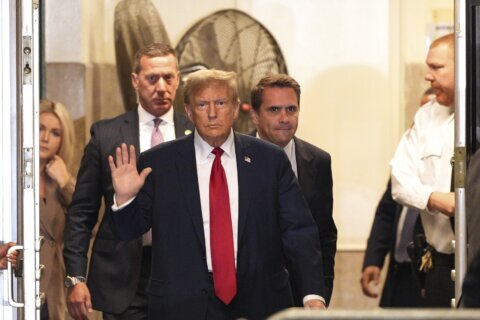BATON ROUGE, La. (AP) — Louisiana’s Republican state senators Tuesday narrowly voted to overturn Democratic Gov. John Bel Edwards’ rejection of a bill prohibiting transgender students from participating in school sports, on the opening day of the first veto session under the state’s nearly 50-year-old constitution.
But, with that debate shifting to the House for a final decision, it appeared the transgender sports ban might be the only veto that could be overridden in the historic gathering of the majority-GOP House and Senate.
Senators blocked efforts to override a separate measure that would remove the permitting requirements, background check and safety training required to have a concealed handgun in Louisiana — and three other veto overrides that were attempted failed in the chamber.
The House planned to start its debates Wednesday.
It was unlikely the Senate could overturn any other Edwards vetoes after one GOP senator, Pat Connick of Jefferson Parish, said he wouldn’t support additional overrides outside of the transgender sports ban bill. That decision gives senators too few Republican votes to overrule a veto on their own.
Senators voted 26-12 for the transgender sports ban veto override — the exact number of votes needed. The vote fell along party lines, with Republicans in support of the measure and Democrats in opposition. In the House, Republicans will need to pick up some backing from Democrats and independents to overturn the veto and enact the ban in law.
Supporters described the prohibition sponsored by Franklinton Sen. Beth Mizell, the Senate’s second-ranking Republican, as protecting girls across K-12 schools and colleges from unfair competition. They said transgender athletes have an automatic, built-in advantage in competitions against other females.
“Without protection, women’s sports would not exist. Nothing has changed,” Mizell said. She added: “I ask you to do what is right for the girls of Louisiana and to put the politics aside on this.”
The legislation is similar to bans passed by Republican-led legislatures in several states, such as Mississippi, Tennessee, Arkansas and Florida.
Opponents, including Edwards, have called the measure discriminatory. They note that bill backers can’t point to a single example of a Louisiana-specific problem. And they said the Louisiana High School Athletic Association already has enacted the equivalent of a prohibition on transgender athletes participating on high school sports teams.
“I’m convinced this bill is a solution looking for a problem,” said Sen. Jay Luneau, an Alexandria Democrat.
New Orleans Democratic Sen. Karen Carter Peterson said passage of the law would threaten Louisiana’s ability to attract business and sporting events, a point argued by business organization leaders from Baton Rouge and New Orleans. Peterson said 400 major corporations have publicly stated opposition to discrimination against transgender people.
“You can’t have it both ways,” she said. “You either want businesses to come to Louisiana or you can discriminate.”
But Sen. Mike Fesi, a Houma Republican, told his colleagues they should think about their “daughters and granddaughters” and their “good, decent morals.”
In the House, a handful of opponents to the transgender sports ban briefly tried to protest in the balcony, only to be forcibly removed from the chamber.
Edwards’ vetoes of the transgender sports prohibition bill and the concealed carry measure sponsored by Republican Sen. Jay Morris were the driving forces behind Republicans’ decision to return to the Louisiana Capitol.
But the vote to enact the concealed carry measure was 23-15, three votes short of the two-thirds requirement. Four senators voted for the bill during the regular session but refused to overturn Edwards’ veto: Connick; Louie Bernard, a Natchitoches Republican; Franklin Foil, a Baton Rouge Republican; and Gary Smith, a Norco Democrat.
Though the law enforcement community is split on the legislation, Bernard said he changed his mind after hearing from police officers who believe removal of the permitting requirement could make their jobs more dangerous.
“Until I’m ready to put on the badge and wear the uniform, I can’t ignore that view,” he said.
Morris, of Monroe, said his bill was about the right to “protecting our families and protecting our property.” He resisted suggestions that loosening restrictions would put police at greater risk.
“I don’t know if the world can get any more dangerous,” he said.
The veto session can last up to five days, but legislative leaders said they hope to wrap up before Saturday. In all, Edwards jettisoned 28 bills from the regular session that ended in June that lawmakers could consider for overrides — though that seemed unlikely.
While convening the session required only majority support, Republicans in the House need the votes of Democrats or independents to reach the two-thirds required to successfully override a gubernatorial veto.
___
Follow Melinda Deslatte on Twitter at http://twitter.com/melindadeslatte.
Copyright © 2024 The Associated Press. All rights reserved. This material may not be published, broadcast, written or redistributed.







